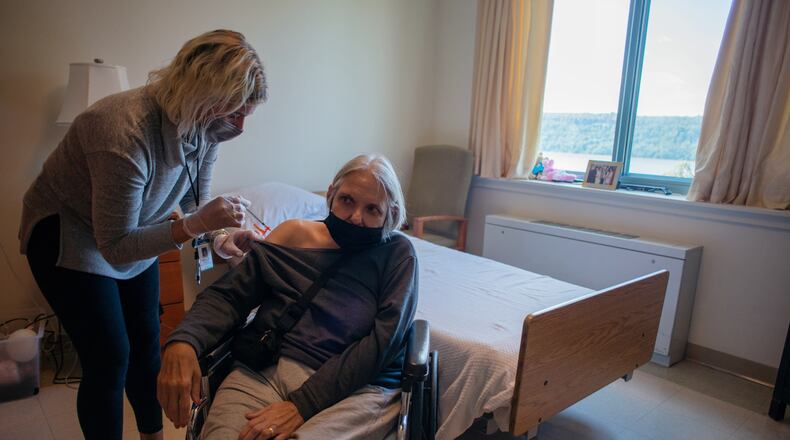Prior to COVID’s wave of omicron, researchers found increased staff vaccinations at nursing homes correlated with fewer COVID-19 cases and deaths among residents, according to a recent study published in the Journal of the American Medical Association. But protection waned as the virus evolved, making boosters particularly important.
Researchers found between May 30 to Dec. 5, 2021, there were fewer COVID-19 cases and deaths among residents, as well as fewer cases among staff, when more nursing home staff members were vaccinated. In a secondary analysis of the omicron wave from Dec. 5, 2021, to Jan. 30, 2022, increasing staff vaccination rates were not associated with lower rates of adverse COVID-19 outcomes in nursing homes, according to this study. Researchers in the study said policy makers may want to consider longer-term policy options to increase the uptake of booster doses among staff in nursing homes.
Doctors and health professionals said waning immunity from the primary series of vaccinations has led to more COVID-related deaths among individuals who have had some type of vaccination, leading to more emphasis on booster shots that became available in September that directly target strands of the omicron variant.
“It is important in a nursing home environment to be very careful and proactive because the residents there are incredibly vulnerable,” said Chip Wilkins, program director for the Long Term Care Ombudsman Office in Region 2, the Dayton area. “You want to take steps to minimize the risk of illness.”
Peter Van Runkle, executive director of the Ohio Health Care Association, said federal agencies are shifting from requiring staff at nursing homes that participate in Medicare and/or Medicaid to get vaccinated, to urging residents to get boosters.
Approximately 48% of nursing homes voluntarily reporting detailed vaccination data are up to date with COVID vaccinations, including the bivalent boosters, among their residents, according to the U.S. Centers for Disease Control. Ohio is lower than the national average, sitting at 41%, according to the CDC. When looking at staff, about 10% of staff at nursing homes voluntarily reporting data have received a bivalent booster shot or completed their primary series in the last two months.
“They’ve shifted the focus because residents being older people, in most cases, have various medical conditions that makes them more susceptible to negative outcomes from COVID. They’ve really put the focus on protecting them,” Van Runkle said.
Thomas told the Dayton Daily News previously that people who are vaccinated with the updated booster are 18 times less likely to die from the virus and three times less likely to test positive. Additional research is showing the bivalent boosters are also contributing to a decreased risk of hospitalizations, she said.
Early estimates on the effectiveness of bivalent boosters also showed the new boosters provided 73% additional protection against COVID-19 hospitalization compared with past monovalent mRNA vaccination only, according to the CDC. The monovalent vaccinations only targeted one strain of the virus.
Getting residents of nursing homes vaccinated sometimes lies with the loved ones consenting to those vaccinations.
“Turning to getting residents vaccinated again and take the bivalent booster, which has been a big push for the last four to six weeks, that is a tough sell. In many cases, the decision is being made by people who are not the resident and the resident doesn’t have the capacity to make that decision, so their family members are deciding whether they want to consent to the vaccines,” Van Runkle said.
Since the COVID shots don’t guarantee an individual won’t get COVID, Van Runkle said some family members don’t see the value of getting the booster for their loved ones, even though the shots show improved chances of survival and decreased hospitalizations.
“There’s a lot to overcome there in terms of education,” Van Runkle said.
New variants are also spreading, with the CDC saying the omicron variant XBB.1.5 is making up 72% of new cases in the northeast U.S. Public Health says the best way to protect yourself and others and is to stay up-to-date on vaccinations.
Thomas said the outbreaks of COVID at local nursing homes are strongly associated with community spread, and that the residents face an increased risk because of their age and the other conditions that they may have.
“Because of that, family, friends, and staff need to be up-to-date on their vaccinations,” Thomas said. Staying up-to-date on vaccinations will also allow family members and friends to visit their loved ones living in nursing homes safely.
“We know that the virus is dangerous, but so is social isolation,” Thomas said.
About the Author

